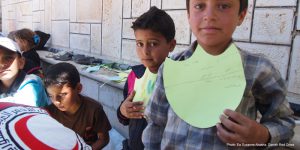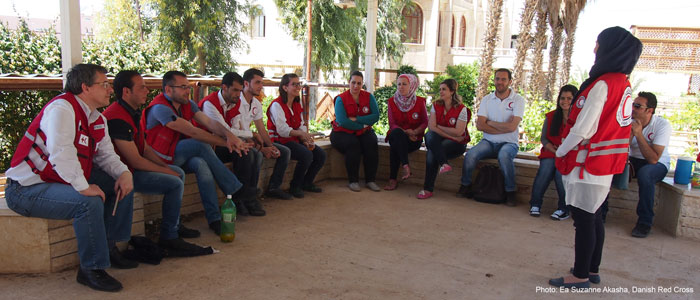By: Ea Suzanne Akasha, psychosocial support delegate, Danish Red Cross
Psychosocial support (PSS) delegate Ea Suzanne Akasha from Danish Red Cross spent the last week of April in Damascus reviewing the PSS activities and supporting the Syrian Arab Red Crescent (SARC). The PS Centre asked Ea to write about her experiences and impressions:
Worried legs
I leave Beirut for a week in Damascus to review a PSS programme in the Syrian Arab Red Crescent (SARC). A driver picks me up and I learn to say “straight ahead”, “left” and “right” so we can chat along the way. I am worried that my visa will not be at the border for some reason, but everything is fine and officials welcome me to Syria. Driving into Damascus, I see daily life going on in a pleasant and green city. There are pavements so one doesn’t have to negotiate non-verbally with every car as in Beirut. Arriving in SARC in the early afternoon, I find a beehive of busy, engaged and warm people. We go over the plan for my visit and I learn that some field visits may not be possible for security reasons. “Boom”. Once in a while, I look nervously around as loud sounds known as “outgoings” emerge from mortar grenades. In the evening, my legs are shaky and I realize my muscles are reacting to the scare.
Clap your hands
 Once we get the go ahead for one of the planned visits, it is time to venture out and see what the psychosocial teams are doing in the field. “Hurry, hurry.” We grab our vests, notepads and cameras, and rush off. We are waved through checkpoints and arrive at a shelter for internally displaced people (IDPs). A large number of families are living in a shelter in unfinished buildings next to a garbage dump above an open sewer with unsanitary water. One hundred and fifty children of all ages are clustered around volunteers in the shade; most don’t even notice us, as they are busy drawing, writing and cutting a shield out of paper. They talk to their volunteer about who can protect them and with whom they feel safe. Witnessing underprivileged children light up when learning useful life skills always moves me. Singing and game playing end the session and everyone participates joyfully.
Once we get the go ahead for one of the planned visits, it is time to venture out and see what the psychosocial teams are doing in the field. “Hurry, hurry.” We grab our vests, notepads and cameras, and rush off. We are waved through checkpoints and arrive at a shelter for internally displaced people (IDPs). A large number of families are living in a shelter in unfinished buildings next to a garbage dump above an open sewer with unsanitary water. One hundred and fifty children of all ages are clustered around volunteers in the shade; most don’t even notice us, as they are busy drawing, writing and cutting a shield out of paper. They talk to their volunteer about who can protect them and with whom they feel safe. Witnessing underprivileged children light up when learning useful life skills always moves me. Singing and game playing end the session and everyone participates joyfully.
Lessons learnt workshop
Although the lessons learnt workshop for the PSS programme was sparsely attended due to travel constraints to Damascus, the two-day course allowed participants to evaluate the challenges, achievements, unexpected positive outcomes and needs of volunteers to adapt to the changing circumstances and improve the next programme. On the second day, the atmosphere became particularly animated when volunteers share personal stories of loss and despair, as well as their joy in the many achievements they see coming out of the programme. “Every morning, when I come to the psychosocial centre to open for the day, internally displaced people have been waiting for an hour outside to come in.” Stories like these capture the widespread need for a listening ear, support groups, games and fun in a safe environment to restore hope.
Volunteers
With the second field visit cancelled, there is time for a proper meeting with the outreach team. Sitting on the roof of an unfinished building, internally displaced families send us coffee and snacks – a gesture that was very much appreciated. Volunteers talk about their work, the distress caused by the “outgoings”, concerns for IDPs living in meager conditions and appreciation of the bi-monthly defusing sessions.
Adapted legs
On day seven, I have gotten accustomed to the noises of the “outgoings”. My legs have adapted and are no longer scared.
Before my visa expires, I meet with SARC management to discuss recommendations before I get in the car and head back to Beirut; SARC management is so fully committed to support volunteers psychosocially that I hardly have time to offer ideas before SARC jumps in with theirs.
Back in Beirut, I remember the stories of volunteers assisting in distributions or evacuations and how, after a day’s work of psychosocial support, instead of going home to their families, they stay with me. I already look forward to coming back and working again with the team.
